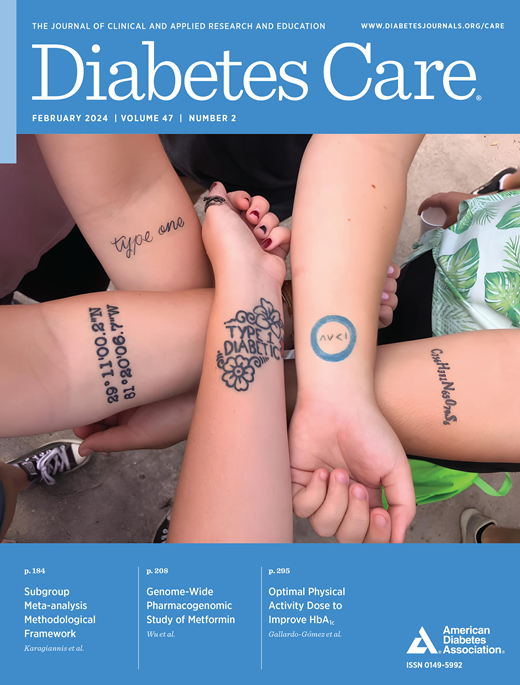体重在目标范围内的时间与超重/肥胖和 2 型糖尿病患者肾脏预后风险的关系
IF 14.8
1区 医学
Q1 ENDOCRINOLOGY & METABOLISM
引用次数: 0
摘要
目的 我们评估了超重/肥胖和 2 型糖尿病(T2DM)患者体重在目标范围内的时间(TTR)与肾脏综合结果的关系。研究设计与方法 本研究的对象是 "Look AHEAD(糖尿病健康行动)"试验中基线估计肾小球滤过率(eGFR)≥60 mL/min/1.73 m2 的 3,601 名参与者。体重TTR定义为头4年中体重在减重目标范围内(体重比基线下降≥7%)的时间比例。主要结果是综合肾脏结果,定义为 eGFR 从基线下降≥30%,并在随访时降至 <60 mL/min/1.73 m2 的水平,或终末期肾病。结果 在中位 8.0 年的随访期间,共记录了 435 例综合肾脏结果。前 4 年的体重 TTR 与随后的综合肾脏结果风险成反比(每 SD 增量;调整后危险比 [HR] 0.81;95% CI 0.70-0.93)。因此,体重TTR为0%、>0%至<29.9%、29.9%至<69.7%和69.7%至<100%的参与者,其综合肾脏结果的调整HRs(95% CI)分别为1.00(参考值)、0.73(0.54-1.00)、0.71(0.52-0.99)和0.54(0.36-0.80)。尿白蛋白与肌酐比值增加一倍(次要结果)也有类似的结果。结论 超重/肥胖和 T2DM 参与者的体重 TTR 越高,减重目标≥初始体重的 7%,肾脏疾病风险越低。本文章由计算机程序翻译,如有差异,请以英文原文为准。
Association of Body Weight Time in Target Range With the Risk of Kidney Outcomes in Patients With Overweight/Obesity and Type 2 Diabetes Mellitus
OBJECTIVE We assessed the relationship of body weight time in target range (TTR) with composite kidney outcome in people with overweight/obesity and type 2 diabetes mellitus (T2DM). RESEARCH DESIGN AND METHODS Included in this study were 3,601 participants with baseline estimated glomerular filtration rate (eGFR) ≥60 mL/min/1.73 m2 from the Look AHEAD (Action for Health in Diabetes) trial. Body weight TTR was defined as the proportion of time during the first 4 years that body weight was within the weight-loss target (a weight loss of ≥7% from baseline). The primary outcome was composite kidney outcome, defined as eGFR decline ≥30% from baseline and to a level <60 mL/min/1.73 m2 at follow-up visit, or end-stage kidney disease. RESULTS During a median follow-up of 8.0 years, 435 cases of composite kidney outcome were documented. Body weight TTR during the first 4 years was inversely associated with the subsequent risk of composite kidney outcome (per SD increment; adjusted hazard ratio [HR] 0.81; 95% CI 0.70–0.93). Accordingly, the adjusted HRs (95% CI) of composite kidney outcome were 1.00 (reference), 0.73 (0.54–1.00), 0.71 (0.52–0.99), and 0.54 (0.36–0.80) for participants with body weight TTR of 0%, >0% to <29.9%, 29.9% to <69.7%, and 69.7% to <100%, respectively. Similar results were found for a doubling of the urine albumin to creatinine ratio (secondary outcome). CONCLUSIONS A higher body weight TTR, with a weight-loss target of losing ≥7% of initial weight, was associated with a lower risk of kidney outcomes in participants with overweight/obesity and T2DM.
求助全文
通过发布文献求助,成功后即可免费获取论文全文。
去求助
来源期刊

Diabetes Care
医学-内分泌学与代谢
CiteScore
27.80
自引率
4.90%
发文量
449
审稿时长
1 months
期刊介绍:
The journal's overarching mission can be captured by the simple word "Care," reflecting its commitment to enhancing patient well-being. Diabetes Care aims to support better patient care by addressing the comprehensive needs of healthcare professionals dedicated to managing diabetes.
Diabetes Care serves as a valuable resource for healthcare practitioners, aiming to advance knowledge, foster research, and improve diabetes management. The journal publishes original research across various categories, including Clinical Care, Education, Nutrition, Psychosocial Research, Epidemiology, Health Services Research, Emerging Treatments and Technologies, Pathophysiology, Complications, and Cardiovascular and Metabolic Risk. Additionally, Diabetes Care features ADA statements, consensus reports, review articles, letters to the editor, and health/medical news, appealing to a diverse audience of physicians, researchers, psychologists, educators, and other healthcare professionals.
 求助内容:
求助内容: 应助结果提醒方式:
应助结果提醒方式:


